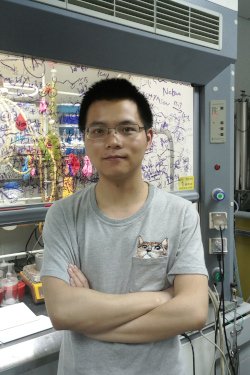Wen Zhang
2022 Regional Award Winner — Post-Doc

Current Position:
Postdoctoral Fellow
Institution:
Cornell University
Discipline:
Organic Chemistry

Current Position:
Postdoctoral Fellow
Institution:
Cornell University
Discipline:
Organic Chemistry
Recognized for: Harnessing electrochemistry to promote reactions of carbon-based compounds without relying on rare or hazardous materials. Historically, chemists have relied on transition metals—such as palladium or nickel—to manipulate the bonds between carbons atoms in organic molecules. Organic chemist, Wen Zhang is pushing forward the burgeoning field of electrochemical synthesis, which uses electricity to promote reactions instead of transition metals, by demonstrating the ability to manipulate carbon bonds in ways that are required to synthesize drugs and other medicinally-relevant compounds. Zhang’s work is sparking a wave of new methods for synthesizing chemicals, and may prove critical in making chemistry more sustainable in the future.
Areas of Research Interest and Expertise: Organic Chemistry, Electrochemistry, Synthetic Chemistry, Radical Chemistry
Previous Positions:
BS, Sichuan University, China
PhD, Shanghai Institute of Organic Chemistry, China (Advisor: Guosheng Liu)
Research Summary:
Many chemical reactions rely on the creation of radicals, molecules with an unpaired valence electron. Enzymes do this naturally to promote chemical reactions in our body, and chemists have been using transition metals, such as nickel or palladium, to create radicals in the lab. Wen Zhang, PhD, is forging a new path by discovering chemical reactions using electrochemistry: the practice of applying an electric current to chemical compounds. By creating radicals just using electricity, Zhang fosters reactions necessary to make drugs with much less energy and fewer rare or hazardous materials.
Zhang’s postdoctoral work began by utilizing light and electricity to unlock new reactivity from riboflavin, an enzyme cofactor found naturally in the body. Inspired by these findings, Zhang turned to using electricity on its own to promote chemical reactions. He has made his most significant impact by demonstrating the ability to take a common type of carbon-based compound, alkyl halides, and transform them into more functional, medicinally-relevant compounds like drugs. Manipulating alkyl halides is a particularly challenging but significant kind of reaction, and Zhang was one of the first to demonstrate a more practical method to perform these reactions using electrochemistry. Similar transformations are hard to achieve using conventional synthetic methods. Zhang’s discoveries have inspired multiple new projects within his current research group and have already established him as a leader in the burgeoning field of electrochemical synthesis.
My research focuses on developing novel synthetic methods to construct complex molecules from readily available feedstocks using electrochemistry. My research goal is to help people make pharmaceuticals and materials faster, more efficiently, and more sustainably using our developed methods.
Key Publications:
Other Honors:
| 2019 | First Prize, Shanghai Natural Science Award |
| 2019 | Excellent Doctoral Dissertation, Chinese Academy of Sciences |
| 2019 | Reaxys PhD Prize Finalist, Elsevier |
| 2018 | Outstanding graduate students of University of Chinese Academy of Sciences |
| 2017 | Special Prize of the President Scholarship for Postgraduate Students, Chinese Academy of Sciences |
| 2016 | Graduate National Scholarship, China |
In the Media:
Cornell Chronicle – Electrosynthesis energizes sustainable drug development
Chemical & Engineering News – Electrochemistry forges C–C bonds in two new cross-electrophile couplings
Nature – Electrification promotes tricky synthetic chemical reactions
Synform – Electrochemically Driven Cross-Electrophile Coupling of Alkyl Halides